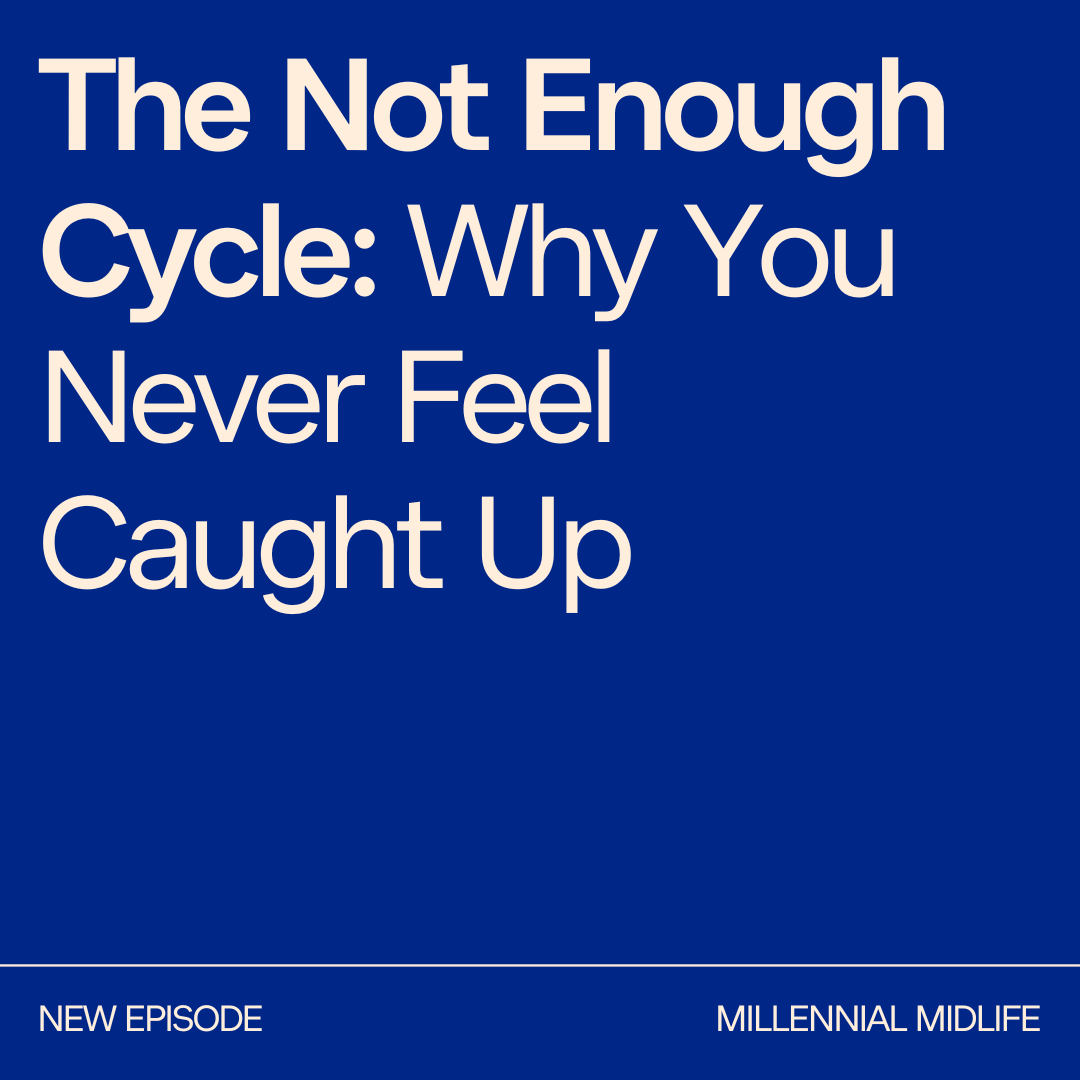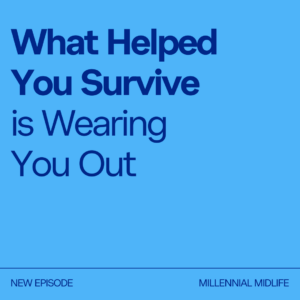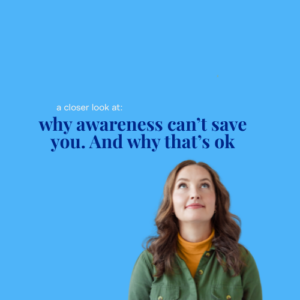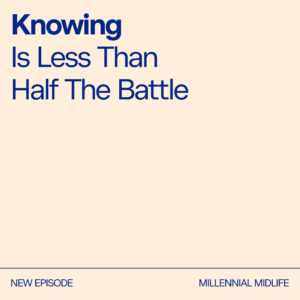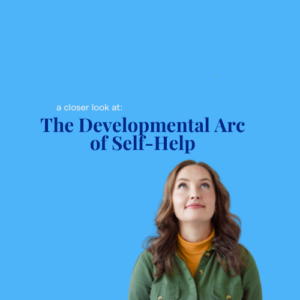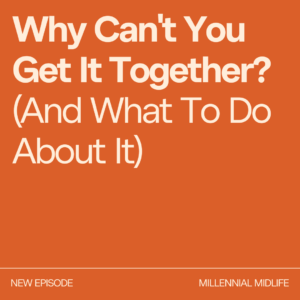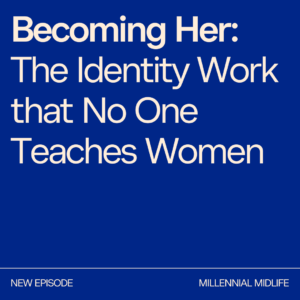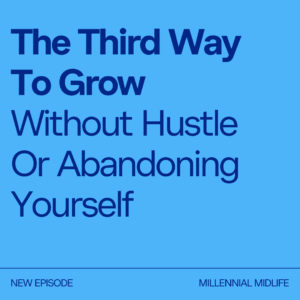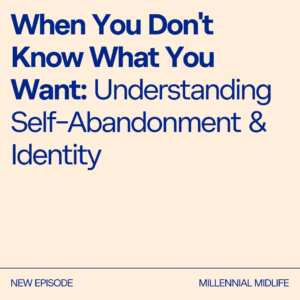Have you ever found yourself lying in bed at night replaying the day, not in celebration of what you did, but in quiet judgment of what you did not do? Maybe it’s the list of tasks that didn’t get crossed off. Maybe it’s the moment with your kid that you think you could have handled better, or perhaps that work project still have finished or that moment you didn’t speak up, or maybe you spoke up, but you think you went too far or that nagging thought.
that you think you should have done more, made more, be more by now in your life. I call this the not enough cycle. It’s the loop that your brain gets into. Very often for me and a lot of my clients, it’s late at night, but sometimes it can happen in the middle of the day when you see someone or something, maybe someone doing something that’s gonna be on social media that you think you should be doing, maybe a reminder of this thing you swore that you would do or wouldn’t do.
And it sounds like this, you’re not enough, you haven’t done enough, you don’t have enough, and you won’t feel good enough, you won’t feel happy, won’t feel satisfied, you won’t feel like enough until you have those things. I feel it even just talking about this right now. The really interesting and…
Cecelia Baum Mandryk (02:32.652)
maybe even funny part is that because enough is very nebulous, right? Enough for you today is likely not what enough was for you when you were 10 years old or 25 years old. Because it’s never quantified, there is no clear finish line. You can never actually get there.
Cecelia Baum Mandryk (02:58.456)
For me and for so many of my clients, this shows up as a quiet hum of discontent. There’s this sense of comparison, this sense of measuring yourself against someone else, but very often it’s measuring yourself against an ideal that you’ve created in your own head. A version of yourself who always gets it right, who always finishes the list, who somehow always feels calm, successful, ahead of schedule, who…
meal preps, who works out, who is the best parent, who is a model employee or leader, whatever it is for you, there’s a version of yourself who does it all every single day, like a machine, right? They’re at peak performance every single day. And when that version, when your own lived version doesn’t actually match up with that ideal version, when there’s some dissonance there, your brain says, see, you’re not enough.
And that’s why you should feel shame, embarrassment, not accomplished, whatever it is. This can sound really small, this kind of constant thing that’s going on in our head, but the impact is really massive, right? You can feel it in your body. Even as I’m talking about this, and I’m talking about this from a more intellectual capacity, I can feel myself kind of wanting to like…
shrink back, can feel a kind of tightening in my chest. So you can notice for yourself, maybe it’s the tightening in the chest, maybe it’s a little panic or urgency in your belly. Maybe it’s that like a tightening in your throat feeling like you don’t have a voice anymore, this sinking sense of being behind. And the impact, unfortunately, does not stop at physical feelings in our body. It changes confidence, it changes how we talk about what we’re doing, how we show up as a parent, the actual actions we take in daily life. So
I mean, if you think about it, no one is showing up as a compassionate, present human being when they’re in a self-loathing loop. Right? No one is showing up as a good parent when they’re telling themselves, should be a better parent. No one is being an amazing, inspiring leader when they’re telling themselves, I need to do more to be an amazing, inspiring leader. If you think about it from like a sports perspective, this makes us a little bit of a tangent, but.
Cecelia Baum Mandryk (05:08.398)
If you think about it from a sports perspective or performance perspective, it makes total sense. If you think about somebody like Taylor Swift, she’s not back in her dressing room getting ready for a show, being like, I bet somebody else could sing the song better. I really haven’t done enough to prepare. I’m probably going to fail. That’s not the pep talk she’s giving herself. That’s not why she’s… If she did that, she would not have the number of people listening to her song, millions of people, hundreds of millions of people listening to.
her songs as soon as they come out. She wouldn’t be there. We probably wouldn’t even know her name. So you might recognize this as the voice that shows up right before bed whispering what you didn’t do. Or maybe it’s in middle of a workday when you hear someone else has accomplished something and instantly you measure yourself against them. Or maybe even it’s with something like money, that thought of I don’t have enough or when I finally do, I’ll feel safe. Whatever it is, we tell ourselves if I just had two more hours, if I just had two more days, if I just had two.
thousand more dollars or two hundred thousand more dollars, then I could rest, then I’d feel good, then I’d feel safe, then I’d feel accomplished. But of course that moment, it never comes. Because even if we do get to where we want to get, even if we do have the two more hours, when we’re in the loop of telling ourselves there isn’t enough time, it’s not enough. It’s not enough, right? That’s the loop. That’s the actual loop, right? So even if we get there, we’re so busy telling ourselves that we don’t have enough.
that we don’t actually have enough, right? When you tell yourself you don’t have time, even if you magically get two extra hours in your schedule, when you’re telling yourself it’s not enough, you don’t actually use it, you kind of waste it, right? You piddle it away, you scroll through it. And so you telling yourself there’s not enough actually guarantees that you don’t have enough and you don’t actually get to feel the things you do have. Okay, so what do we do when this feeling hits, right? When you’re there.
Usually one of a few things and this is a great place to get curious for yourself because I can’t tell you exactly what you do when this hits what we do usually this is what we do to avoid it right because we don’t want a feel the feeling of not enoughness and So some of us push harder, right? We try and prove that we do have enough or we try and get enough some of us withdraw So we like kind of go away from it Some of us numb out food scrolling shopping
Cecelia Baum Mandryk (07:33.804)
another glass of wine. You can also numb out with organizing, cleaning, working, working out. Others just try and ignore it totally, right? We just try and like walk away from it. This pattern, if you’re in it, if your brain is in it, it shows up everywhere. And for a lot of people, it shows up throughout the year, but it can get especially louder on the holidays or work, especially in Q4, right? We’re in Q4 now. We’re getting close to the holidays. Things are already ramping up.
And this is this, the voice, particularly if you’re a parent or a mother, I need to do more to make this special. If you’re a leader, I need to make sure we finish the year strong. I need to buy more. I need to do more. I need to get more. I need to finish this year strong so that I’m ahead for new years, right? So that next year I can kind of get even further ahead. The truth is the cycle is very exhausting. It drains us emotionally. It drains us energetically. It keeps us out of the present moment, right? Because we’re busy, when we are busy chasing enough,
We’re never actually in our lives. I’m say that again, because I think it’s so powerful. When you’re busy chasing, whatever it is you’re chasing, you’re not in the life that you have. You’re looking backward, feeling like you failed, or forward, feeling overwhelmed, and you miss the only place you can actually feel satisfied, the present moment. The place that you can actually feel good and safe and accomplished and happy, the present moment.
All this work, all this mindfulness, all this mumbo jumbo, that’s exactly what we’re trying to do. Get to this present moment so we can actually feel connected to ourselves and grounded and confident. The only place you can do that is in this present moment. Okay, so what can you do instead? Instead of being stuck in this loop, to be clear. What can you do instead? How can you start to change this loop is the bigger question, right? How can you start to do this thing? How can you start to get into the present moment? So the very first thing that I…
work with all clients on, right? The thing that we try and do is notice to expand our awareness. So the very fact that you’re listening to this episode and maybe even identifying in your own life where you’re in this cycle is huge. It’s such a massive part of the work. And listen, I know that noticing can sound small, like really, that’s it, but that’s your brain being sneaky, telling you that even awareness isn’t enough, right? We’re right back in the loop.
Cecelia Baum Mandryk (09:55.458)
but when you notice and name what’s happening, my brain is doing that not enough thing again, and you bring what’s been on autopilot into your conscious mind, into that working space of your brain, what you do is you move from the pre-programming, the autopilot into presence. And that awareness, that expanded awareness is where everything begins to shift. This is the juiciest moment. This is really truly the juiciest moment.
because suddenly you can see your story. You can see the story that your brain is telling you, and you can feel the emotion that comes with it without automatically reacting. And that is the pattern interrupt. That’s where all of the change, all of the big change begins. Honestly, I cannot emphasize this small moment enough. All of your power is right there, right here in this moment, right in the moment of noticing.
Because when you notice the not enough story, when you say this is just a story my brain is in, this is a habit my brain has been in, but I can see it for what it is now and now I get to change it. Okay, so here’s what’s happening underneath. That not enough feeling hits. Most of us move into a sympathetic nervous system state, fight, flight, freeze, or fawn, and our body thinks there’s danger. And the interesting thing, the not enoughness is honestly a survive, I mean, you’re…
I’m not talking with each of you individually. I’m not talking with you individually. So I don’t actually know your exact story. But oftentimes we get the not enoughness because we want to be acceptable. We want to be loved. We want to feel worthy. We want to feel safe. And so we have some variation of a story around that. And our brain thinks that if it holds the not enoughness over us, it will convince us to accomplish more so that we will move into the safety, acceptance, worthiness, love, you know, that kind of thing. I was going to say safety again, but
We’re used to safety. Our body thinks that there’s danger, right? When we’re in this place, because this part of your brain actually doesn’t know the difference between physical danger and intellectual danger. And when that happens, so when it thinks there’s danger, part of your brain kind of goes offline. Your creative and cognitive thinking goes offline. And that’s when the old program really takes over. So it really, really begins to get deeper and deeper in there and it brings up old stuff and it brings up all kinds of evidence.
Cecelia Baum Mandryk (12:18.53)
Your brain is just trying to help you feel safe in that moment. So you’re scrambling for something. Or so you do scramble for something, right? In that moment, when you feel really insecure, you feel unsafe, you feel like a failure, your brain oftentimes wants to avoid that. That’s when we grab the snack, when we have a little scroll, a glass of wine, an impulse purchase, when we try and organize something or do something to get a sense of safety and control in that moment. But the external fix will always fall short because the relief is temporary.
Right? Scrolling might feel kind of fun. The cat video is kind of funny, but you haven’t actually changed the thing that felt dangerous in your brain. You’ve just distracted yourself. What you really need in that moment is internal safety, which is the ability to soothe your nervous system and remind your brain that we are okay right now. And when you notice the story and you take time to engage with yourself in that moment and soothe your nervous system, that’s what doing this work all is, right? Where that’s all we’re doing. We’re always just bringing awareness, we’re engaging.
we’re soothing, we’re taking a line to action, we’re reiterating that over and over again, you bring the sense of I’m actually okay right now, and I hear the story and I hear the habit, but I can actually shift it. I can recognize it first. Okay, so just for funsies, let’s try and play with a story, right? Let’s try and prove this to yourself, because I almost never want you to just take my word for it. I want you to experience this in your life.
So you might put yourself in a situation where you felt like not enough recently, or maybe you can pretend it’s the end of your day and you have to go pick up your kids or you’re ready to head home, maybe to meet friends for something. Or maybe your tennis lesson that you scheduled is coming up and you need to leave whatever it is you’re doing, but you notice that you haven’t finished everything that you wanted to finish. Maybe things are open or you didn’t even start them. In that moment, or you can imagine yourself in bed, listening to all the things you didn’t do.
And that moment right now, say to yourself, don’t have enough time. I don’t have time to do everything. Notice how that feels in your body. Like I said, I’m doing this intellectually. Like I’m just, I’m guiding you through something and I even feel like a little overwhelmed, right? Like I don’t have enough time. I like take a breath. So for most people, it’s somewhere between frantic and hopeless, but name your own emotion. Now take a breath.
Cecelia Baum Mandryk (14:34.99)
kind of put yourself in that same situation and instead say something like, have 45 minutes before I need to leave. How do I want to use it? I get to choose how I use this time. And here you’re not lying to yourself, right? You’re not telling yourself I have all the time in the world. For me, if I have 45 minutes left before maybe I need to go pick my kids up, I might not have time to record a podcast. Maybe I have time to record it, but not to actually write one out and take the notes and think about what I want to talk about. I need more than 45 minutes for that. But I do know that
I could send a few emails or I could do a little bit of, I could record a few posts for social media or I could respond to some comments. So when I tell myself I don’t have enough time, I usually waste it. But when I tell myself I have 45 minutes and I get to use it intentionally, I remind myself of that, I actually do use it more intentionally. So the circumstances don’t change in that situation, right? But the feeling did. From that place of I have 45 minutes, I felt empowered. I felt like I had earned.
Agency, was going to say urgency, but it’s not urgency. I feel like I have agency in my life. And suddenly everything starts to shift in that moment. The feeling changes and that’s power, right? That’s you being empowered in your own life. The story of not enough will keep you trapped in the same cycle. But when you come back to noticing and becoming aware of what is available, your time, your money, your energy, your presence, you get to feel like you do have agency again. You get to feel capable, empowered in your life.
And that changes who you are and how you are. Again, think of how you show up as a leader or as a parent when you say, I’m not doing enough and I should be better. Probably not like you want to, right? Taylor Swift in the back and like, I should have done more to prepare. She’s probably not gonna show up on stage as this really powerful figure, right? That’s not how she’s talking to herself. She’s giving herself a pep talk.
not this like put down and most of us do the opposite and think it’s somehow going to motivate us. So just becoming aware of that’s what you’re doing can really change things. All right, when that pattern sneaks up on me, I actually talk to my brain when I’m in a place that I can’t do this. I literally say to myself, I see what you’re up to. I’ve heard this story before. I’ve heard this story before. I’ve heard you tell me this before. I am on to you. Sometimes you do a quick round of tapping. Sometimes I take a few slow breaths.
Cecelia Baum Mandryk (16:52.514)
but really noticing it is where everything starts to change. Acknowledging the cycle is the biggest part of changing it. And I feel like I’ve said it enough in this episode that you’re probably gonna get it by this point, is that acknowledging it, noticing it, recognizing it is so powerful. My brain is in this habit. Over time, you start to hear the inner voice is a little separate from you. Your awareness shifts. It’s no longer you, it’s no longer a truth. It’s this like other thing that’s happening.
It’s not you as you, your awareness, you’re watching this voice. It’s a noisy member of your brain that’s starting to get your, trying to get your attention. Okay, if you’re listening and you’ve gotten to this point and you’re like, yeah, but I really do need more time, money, et cetera. I get it, I have been there. But the story that you don’t have enough actually changes what you do have and how you show up for what you have. When you notice that you don’t have enough, you will continue to notice what you don’t have. When you notice what you do have,
You actually change your reticular activating systems value tagging, and it will show you more things, right? So when you appreciate what you do have, all of your resource time, energy, money, relationships, when you’re in that place, you actually see more possibilities. When you feel good about what you have, you actually step into expansion rather than resignation. And from that place of possibility, more possibility comes to you.
So practicing, recognizing, be realistic with yourself too, right? I’m not asking you to lie to yourself, but also say, okay, I might need more and what do I already have? What is possible for me right now? If I could figure this out, how would I figure this out? When you’re in that presence and that appreciation and self trust, you realize that enough is never outside of you. It’s within you and you can start to feel it from right now. Okay.
Next week, we’re going to take this even deeper, exploring self-concept and identity and how you’re showing up to it, which is fun. It’s one of my favorite topics. This this enoughness. We’re actually talking about it from a money lens in the Life Lab this month. We’re really getting into money stories and our relationship with money stories and who we are when we show up with money. And so this if this is a topic that is interesting to you and you want to change how you’re showing up for yourself in it, come talk to me about the Life Lab or just come join us and dive in, right? Do some of the
Cecelia Baum Mandryk (19:08.012)
the work that we’ve already been doing this month so that you can start to pull it into your life so you can start to untangle these stories even more. can come get coached by me. And just know that if this episode resonated with you, I would love for you, I’d love to do this work with you, right? Either keep listening, follow me on social media, or come join me in a deeper way. And if it really helped you in some way, can you please share it with somebody who you think might need to hear this? Maybe somebody who you commiserate a lot on not having enough maybe time or resources in some way.
All right, thank you so much for listening. And remember, you already have enough within you and all you have to start to do is recognize the habit your brain is in and that starts the process of changing them. Thank you so much for being here. Thank you for listening. Thank you for sharing this or reviewing if you feel called to do so. And I will see you the next time I’m here, bye.

